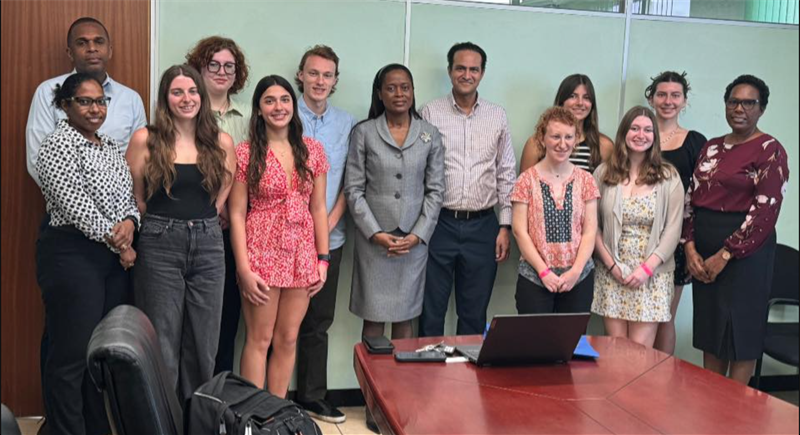Saint Lucia’s Ministry of Commerce Welcomes the University of Delaware
The University of Delaware’s Department of Geography, led by Professor Saleem Ali, embarked on a two-week field research mission to the Caribbean islands of St. Lucia and Martinique. This immersive experience aimed to provide eight students enrolled in the “Environment and Society” course with practical insights into the complex interplay between environmental factors and societal development in the region. The visit to St. Lucia commenced with a courtesy call to the Ministry of Commerce, where Professor Ali and the student researchers engaged in discussions regarding their ongoing research activities on the island. This exchange allowed the students to connect their academic pursuits with the real-world challenges and opportunities faced by St. Lucian policymakers and stakeholders. The comparative element of their research, focusing on St. Lucia and Martinique, aimed to offer a nuanced understanding of diverse approaches to environmental management and sustainable development within the Caribbean context.
St. Lucia, renowned for its lush rainforests, volcanic landscapes, and vibrant coral reefs, presents a unique case study for examining the delicate balance between economic development, environmental conservation, and social equity. The island’s economy is heavily reliant on tourism, which underscores the importance of preserving its natural beauty and biodiversity. The students’ research likely delved into various aspects of St. Lucia’s environmental landscape, including the management of natural resources, the impacts of climate change, and the challenges of sustainable tourism development. Furthermore, the interaction with the Ministry of Commerce suggests an exploration of the economic dimensions of environmental policy and the role of government in promoting responsible development practices. The discussions may also have touched upon the social implications of environmental policies and the importance of community engagement in conservation efforts.
Martinique, an overseas department of France, provides a contrasting perspective on environmental governance and development trajectories. As part of the European Union, Martinique operates within a different regulatory framework and benefits from access to EU funding and technical expertise. This comparative approach allowed the students to analyze the effectiveness of different policy instruments and institutional arrangements in addressing environmental challenges. The research in Martinique likely focused on the implementation of EU environmental directives, the role of French national policies in shaping local environmental management, and the integration of environmental considerations into economic development planning. Furthermore, the comparison between St. Lucia and Martinique likely explored the influence of historical factors, political systems, and cultural values on environmental consciousness and sustainable development practices.
The comparative study undertaken by the University of Delaware students offered a valuable opportunity to examine the interplay between local, national, and international influences on environmental policy and practice. By comparing and contrasting the experiences of St. Lucia and Martinique, the students gained a deeper understanding of the challenges and opportunities associated with sustainable development in island nations. The research findings could contribute to a more nuanced understanding of how small island developing states (SIDS) can navigate the complexities of globalization, climate change, and resource management to achieve sustainable and equitable development outcomes. The inclusion of a visit to the Ministry of Commerce in St. Lucia highlights the importance of bridging the gap between academic research and policymaking, ensuring that research findings inform policy decisions and contribute to real-world solutions.
The “Environment and Society” course, with its focus on the Caribbean, reflects the growing recognition of the interconnectedness between environmental issues and societal well-being. The field research component of the course provided students with an invaluable opportunity to apply theoretical concepts to real-world scenarios, develop critical thinking skills, and gain hands-on experience in conducting research in a complex and dynamic environment. The comparative approach further enhanced their understanding of the diverse challenges and opportunities faced by island nations in the Caribbean and the importance of context-specific solutions. This immersive experience likely fostered a deeper appreciation for the importance of interdisciplinary collaboration and stakeholder engagement in addressing complex environmental and societal challenges.
This type of experiential learning not only enriches the students’ academic experience but also equips them with the skills and knowledge necessary to contribute meaningfully to the field of environmental policy and sustainable development. By engaging directly with local communities, government officials, and other stakeholders, the students gain a deeper understanding of the complexities of environmental governance and the importance of incorporating diverse perspectives into policy decisions. Moreover, this field research experience fosters a sense of global citizenship and encourages students to become active participants in shaping a more sustainable future for the Caribbean region and the world. The comparative study of St. Lucia and Martinique, with its focus on the interplay between environment and society, provides a valuable model for future research and education in the field of sustainable development.
Share this content:












Post Comment